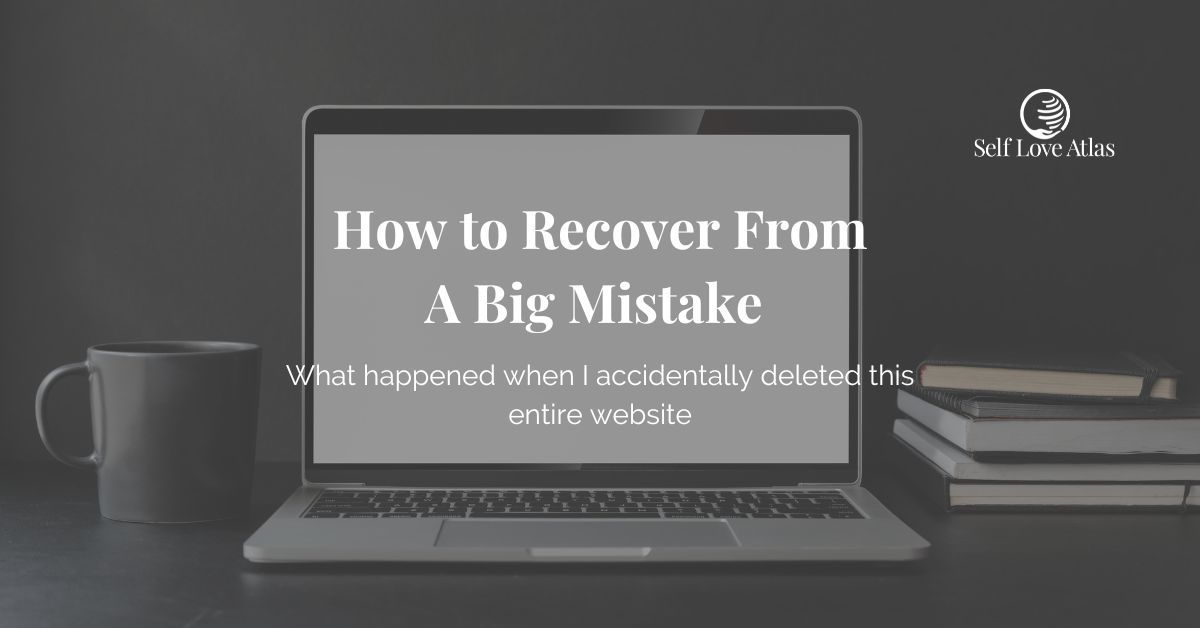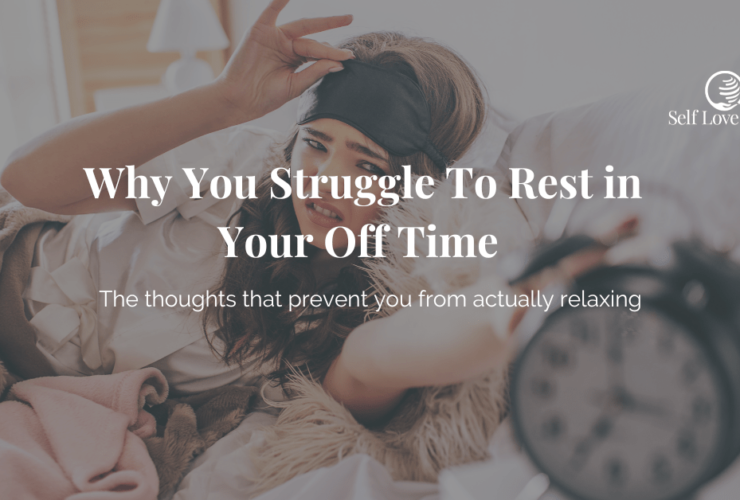How to Recover from a Big Mistake
A few weeks ago, I accidentally deleted my entire business website off the internet. All the pages, all 70 something blog posts… All of it was gone and seemed to be unrecoverable.
When I tried to look up my own website from the frontend, this is what my screen looked like.

When I realized what I had done, the level of fear and horror I experienced was overwhelming.
“What the hell am I going to do?” I thought.
“I’ve been building this library of content and honing my messaging for years, and now it’s all gone!”
I felt panic bubbling up in my gut, but I knew I needed to take action if I was going to recover from this mistake.
When we make a mistake, how we react boils down to one of two options
- beat ourselves up & feel guilty about whatever we “did wrong” or
- lean on our coping skills to handle the situation as best as we can
In other words, we either think, “What have I done?” And “How could I be so stupid?” or “What can I do about this?” and “How might I find a solution?”
Most of us will experience some level of beating ourselves up, but the sooner we can shift to accessing our coping skills, the better we’ll handle the situation.
After I realized what I had done, I did a few things that helped me cope with the circumstance, address the problem promptly, and recover emotionally. These are also things you can do to recover, when you feel like you’ve messed up BIG TIME.
Here’s exactly how I leaned on my coping skills to get through the horrible mistake of a full-on website deletion.
1. Even though my emotions were on the verge of panic, I was aware that I was in a “fight or flight mode”, and knew that I wouldn’t be able to think clearly until I calmed down a bit. So before trying to solve anything, I took some deep breaths and shook out excess energy in my body. (this is called emotional regulation)
Anytime we can notice we are feeling activated/fearful, this means that the prefrontal cortex (the part of the brain responsible for logical thinking) is no longer receiving much blood flow, and therefore it is less functional.
By taking a moment to calm down and breathe, we help turn the logical thinking back on.
You can imagine how much this helps us find a solution to a problem, or communicate our problem more effectively to others when we’re in crisis.
2. I picked a safe person who I knew wouldn’t shame or blame me for making a mistake, my fiancé, and explained what happened as calmly as I could. (For you, this person may not be a partner, it might be a friend or a family member).
Even though I didn’t ask my partner to “help me” solve the problem, I recognized my overwhelm and got help from him in the form of emotional support.
Note: It’s important to explain things calmly if we can. Why? Because fear is contagious. For example, if I were to explain things from a totally panicked place, it could activate fear and stress for my partner too. It could shut down his prefrontal cortex, and make it less likely that he would be able to support me emotionally. We don’t need to be totally calm to get help from others, I certainly wasn’t. But the less panic, the easier it will be to receive that help.
3. I called people who had the power to help me correct my mistakes. For me, that was Bluehost’s support team.
I was so afraid and stressed when I made this call that I could hardly press the correct buttons to get through the phone tree. Once, after waiting on the phone line for a while, I pressed the wrong button and hung up the phone by accident, and then had to start all over again.
I called again, waited, and made sure to explain my problem to the operator (again, as calmly as I could.)
After getting off the phone, I had no idea whether or not my website would be recoverable, so I then turned my attention to helping myself feel okay with the possibility that my website was indeed impossible to restore.
4. To do this, I asked a question that might sound crazy: “How could my website shutting down be FOR me instead of against me?”
To be clear, I am aware that having my entire business website disappear off the internet was not a “good thing.”
It was not a thing I wanted to happen. And if I had the opportunity to choose not to go through this, I would’ve done it in a heartbeat… HOWEVER
I knew I could turn this into something that benefitted me, even if the circumstance sucked, by getting creative about how I thought about the problem.
This is a form of self-trust that I’ve developed through self-coaching and being coached. I know and trust that no matter what happens to me, I can make something good out of it. I truly believe that wholeheartedly.
By getting curious and asking “how could this be for me?”. I invited my brain to consider what I could gain from this situation.
What could I learn? How could I take this challenge and respond to it in a way that strengthens me rather than tears me down?
Here’s what my brain thankfully came up with when I sank into this curiosity…
- What if this is helping me get a fresh start?
- What if this could help me create work that is more aligned with my new messaging?
- What if the posts I had already put out have helped the people they needed to help, and this is encouraging me to write new things that will help more people?
- What if what I need to learn is that my website is not my business? That I, me and my skills, are my business?
- What if this is an opportunity to apply my coaching skills, to help myself through this, and by doing so, become better able to empathize with my clients?
Before, my brain wanted to say that I was
- doomed
- had fatally messed up and
- would not be able to recover.
But by getting curious about how this could be “for” me, I could see the circumstance as
- An opportunity for a fresh start
- A sign to lean more into my skills and personality, and less on my internet aesthetic
- A source of inspiration help me share more of my message and writing
- A challenge to help me be a stronger coach
It was like night and day.
Even if my website couldn’t be recovered, I realized I could handle it. And even if it would be a lot of work to rebuild the site, it would be work worth doing.
Spoiler: In the end, I learned later that my hosting service has backups of all of its sites, so they were able to recover it from the backend after a few days. THANK GOODNESS.
TLDR: When we royally screw up, there are a few things you’ll want to do to increase your chances of recovering and benefitting from the situation.
These are just a few of MANY coping skills that can help us make it through, but they are simple enough that they can be applied to almost any situation.
- Do whatever you need to to calm your body down, so your prefrontal cortex is working and you can respond to the situation by thinking it through instead of responding out of fear.
- From that place, arm yourself with emotional support by letting someone you trust know what you’re going through, so if you start to panic, they can help you re-center and keep going. They don’t need to help you solve it, you just want someone to be in the loop in case you need support.
- Ask for help, or use any connections you have to get in contact with the best person to help solve the problem (this will often be someone OTHER than who you enlist for emotional support, but not always).
- Get curious and see if you can find a way for you to benefit from this situation. Ask how this unfortunate circumstance can either teach you something, or be an opportunity for you to grow in the direction you want to go.
Making mistakes or “messing up” can feel really stressful. And even though the coping skills/steps I offered above are relatively simple, they are a fantastic alternative to beating ourselves up, or feeling “out of control.”
While I can’t guarantee handling stressful situations will ever be “easy”, I can guarantee that leaning on coping skills like these will leave you with far fewer emotional nicks and bruises, and a far greater sense of confidence and self-trust.
Wouldn’t it be nice to be able to make a mistake and have full trust that you can handle it?
If greater confidence and self-trust are something you’re into. You should book a free consultation!
It is totally possible to feel confident in your ability to recover when shit hits the fan. And if you want that confidence, a consultation will show you a clear path to getting it, and make it feel more achievable than ever.
Much love,
Morgan

P.S. Want to work with your psychology to make cleaning your room feel easier? My free course, “Trick Your Brain to Clean Your Room,” is live! Your “room” could be a bedroom, your car, a corner of your basement, a desktop surface, you name it. The class is packed with coaching tools that will make it feel easy to clean up a space (and to maintain that space), without any strict protocol or huge time investments. Click to sign up!





